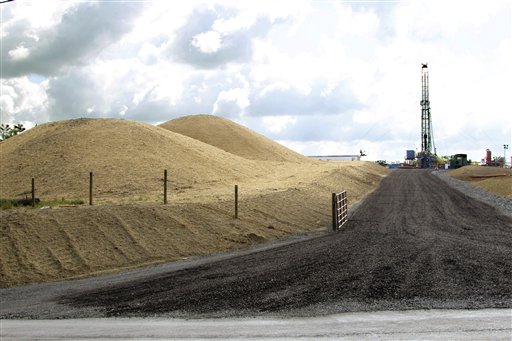Maine has a chance to trim $170 million a year from electricity bills, cut its reliance on oil and take advantage of historically low power costs, but lawmakers first must authorize state government to help bring natural gas here from new gas fields in the Northeast.
That’s the pitch the incoming House minority leader is expected to make when the Legislature reconvenes next month.
Rep. Kenneth Fredette, R-Newport, will promote the initiative with help from an informal working group that has been studying the most effective way for Maine to cut its above-average energy costs.
“We need to be more proactive and be more bold,” Fredette told the Portland Press Herald. “We’re going to look at a bold bill.”
Fredette would not discuss details of his proposal, but people familiar with the plan say it would not use taxpayers’ money to build new pipelines in Maine. Instead, it would aim to give the state the financial and legal authority to secure volumes of gas for Maine homes and businesses by signing contracts with companies that already plan to build or upgrade pipelines in southern New England.
The process could involve expanding the role and authority of the Governor’s Energy Office and creating a panel of experts to review potential investments. It also could ask utility ratepayers to backstop any financial risk, such as by paying added charges if gas demand falls short.
Such details could make the initiative a hard sell.
In a speech last week to mill owners and other large electricity users, Fredette said a primary goal is to reinvigorate Maine’s manufacturing sector. To do that, he said, Maine must figure out how to eliminate a premium that’s paid to get dependable gas supplies delivered here when demand is high in the winter.
That premium, added to the commodity price of natural gas, is called a basis differential. If Maine had authority to buy specific volumes of gas for extended periods, homeowners and businesses could save $170 million a year, Fredette said.
“I want to eliminate the basis differential, or as much of it as we can,” he told members of the Industrial Energy Consumer Group. “This will lower everyone’s electricity costs. … I can think of no single other action state government can take that will provide this large a benefit to the people of Maine this soon.”
Fredette’s proposal has tentative support from Gov. Paul LePage. But Ken Fletcher, who heads the Governor’s Energy Office, said LePage would balk at any financial arrangement that adds a new charge to electricity bills.
LePage’s stance suggests that the politics of the proposal may be complicated.
Democrats, who historically have been more receptive to surcharges for energy programs, now have majorities in the House and Senate, and this proposal is coming from the leader of House Republicans.
And LePage, who frequently cites the state’s high energy costs as a deterrent to business expansion, has had Fletcher working over the past two years to expand natural gas pipelines.
Fletcher recently calculated the impact of converting 20,000 homes from oil heat to gas, based on today’s prices. The savings would be $24 million a year.
“I can’t think of anything else we could do to put more money in people’s pockets,” he said of expanding the availability of natural gas.
Half of New England’s electricity comes from gas-fired power plants, so the region’s economy is highly dependent on gas prices. Since 2008, gas prices have fallen so much that Maine is saving $230 million a year on electricity, according to the Maine Public Utilities Commission.
The savings are tied to the discovery of major gas deposits in shale formations in New York and Pennsylvania. Fredette and others say those gas deposits are providing a new opportunity to drive energy costs even lower.
Pipeline companies are scrambling to move more of the low-cost gas from the Utica and Marcellus fields into New England.
One venture will boost capacity on the Tennessee Gas Pipeline in New York and New Jersey, with plans to extend into New England. Another, due for completion in 2016, will increase capacity on the Algonquin Gas Transmission pipeline through Connecticut and Massachusetts.
Unfortunately for Maine, no pipeline extensions are planned to continue past the Boston area.
That’s where state government can play a role, said Tom Welch, the Maine PUC’s chairman. Under Fredette’s proposal, the PUC would have a say in approving or denying project investments.
“Pipelines that end in Dracut, Mass., don’t physically bring gas into Maine,” Welch said.
Welch, who also spoke to the Industrial Energy Consumer Group last week, said that even if pipeline companies follow through on expansion projects in New England, Maine may need to take steps to ensure that it gets additional volume.
Firm commitments for gas in Maine could convince pipeline owners to increase compression, for more capacity. They could also build a pumping station to reverse the flow of gas along two pipelines from Canada that now pump gas south through Maine to Massachusetts.
Another idea, Welch said, is to join with other New England states to make firm commitments for buying enough gas to finance pipeline expansions.
“This could be a once-in-a-generation opportunity,” he said in an interview. “It makes sense to make sure we have all the tools we need to get the benefits, whether we use those tools or not.”
Maine has a longstanding interest in expanding the availability of natural gas, which is a cleaner alternative to heating oil. Until the 1990s, Maine was literally at the end of the nation’s natural gas pipeline.
That changed after two lines were built through the state from Canada. One of them, the Maritimes & Northeast Pipeline, has linked Maine with the Sable Island gas fields off Nova Scotia, and to a liquefied-natural-gas terminal in New Brunswick.
But production is declining at Sable Island, and the low cost of domestic natural gas has cut LNG imports in New Brunswick. A new field off Newfoundland – Deep Panuke – is expected to bring more gas onto the Maritimes line, but not at the high volumes or low prices that are available from the Marcellus field.
It’s too soon to say how pipeline companies may respond to Fredette’s proposal, but James Grasso, president of Grasso Associates in Needham, Mass., said the approach Maine chooses for financing the venture will be important. He agreed that arrangements putting ratepayers at risk would likely be a hard sell.
“But it’s a very novel approach and a good idea,” said Grasso, a longtime consultant who has worked in the region’s gas industry. “I think Maine would be ahead of its time. I’m not aware of other states using these kind of incentives.”
Staff Writer Tux Turkel can be contacted at 791-6462 or at:
tturkel@pressherald.com
Copy the Story LinkSend questions/comments to the editors.





Success. Please wait for the page to reload. If the page does not reload within 5 seconds, please refresh the page.
Enter your email and password to access comments.
Hi, to comment on stories you must . This profile is in addition to your subscription and website login.
Already have a commenting profile? .
Invalid username/password.
Please check your email to confirm and complete your registration.
Only subscribers are eligible to post comments. Please subscribe or login first for digital access. Here’s why.
Use the form below to reset your password. When you've submitted your account email, we will send an email with a reset code.